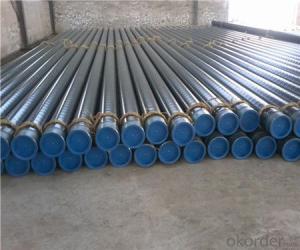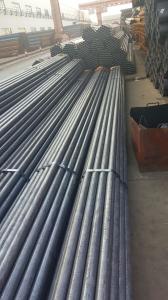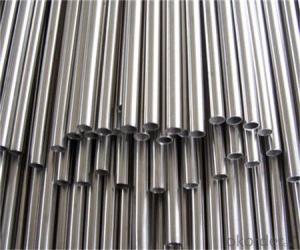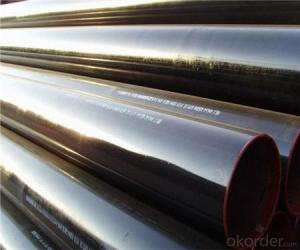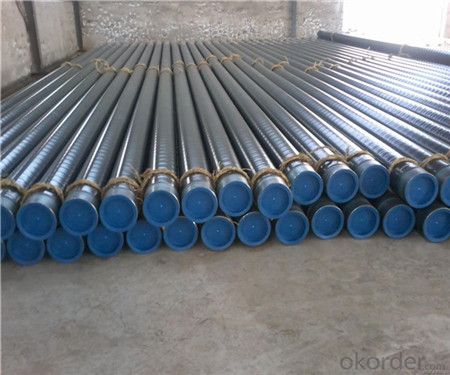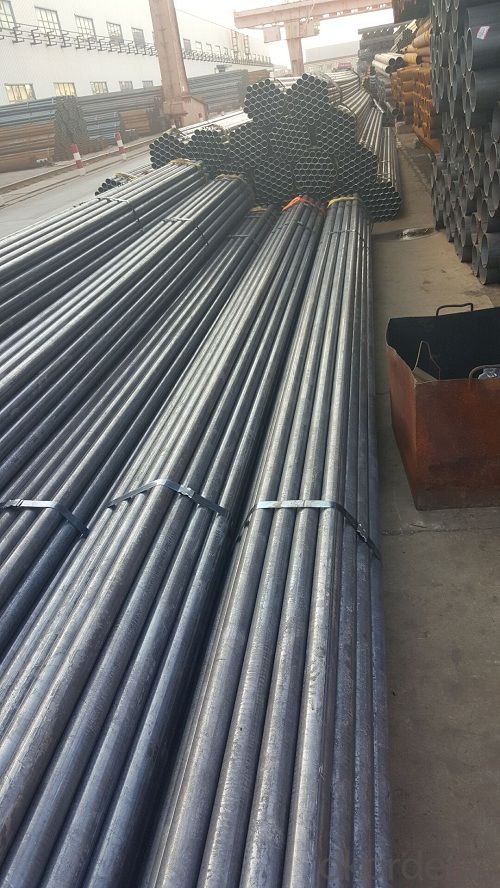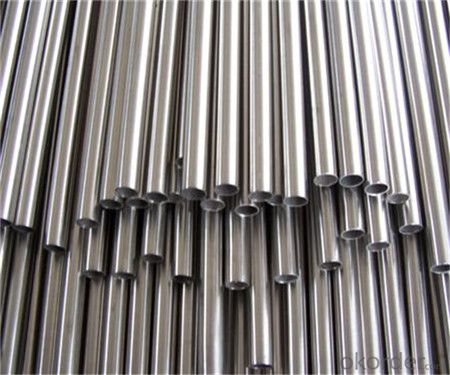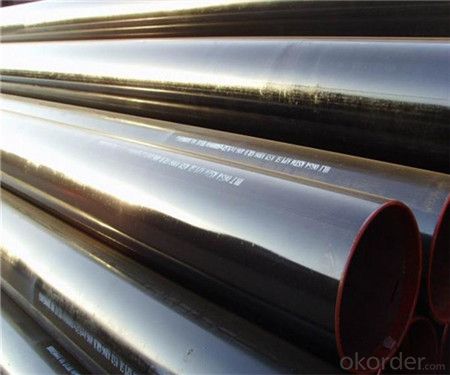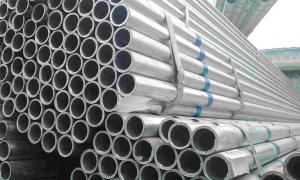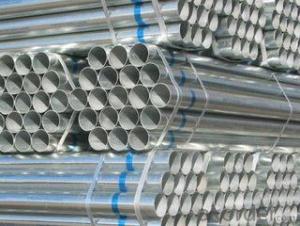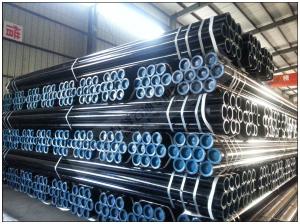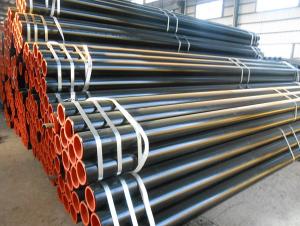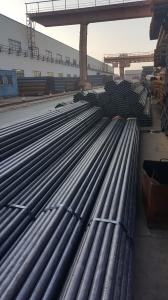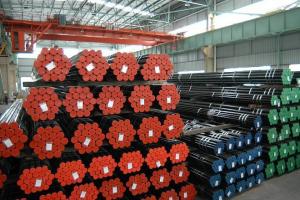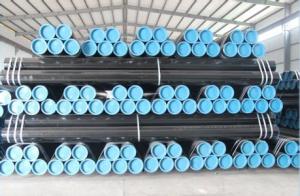Seamless Steel Pipe High Quality with API 5L
- Loading Port:
- Tianjin
- Payment Terms:
- TT OR LC
- Min Order Qty:
- 25 m.t.
- Supply Capability:
- 20000 m.t./month
OKorder Service Pledge
OKorder Financial Service
You Might Also Like
1、Structure of API 5L Line Pipe:
Seamless pipe is formed by drawing a solid billet over a piercing rod to create the hollow shell. As the manufacturing process does not include any welding, seamless pipes are perceived to be stronger and more reliable. Historically seamless pipe was regarded as withstanding pressure better than other types, and was often more easily available than welded pipe.
API 5L Line Pipe Images:
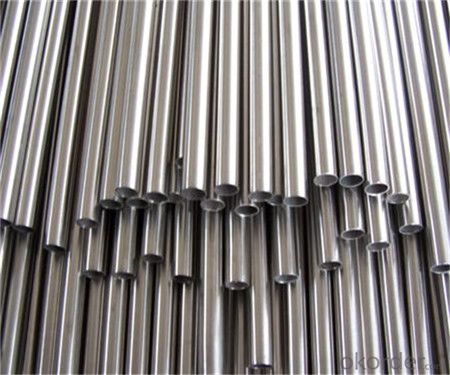
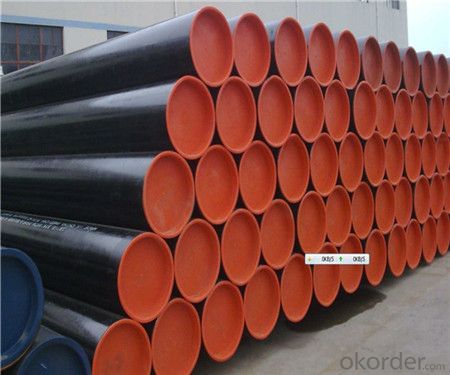
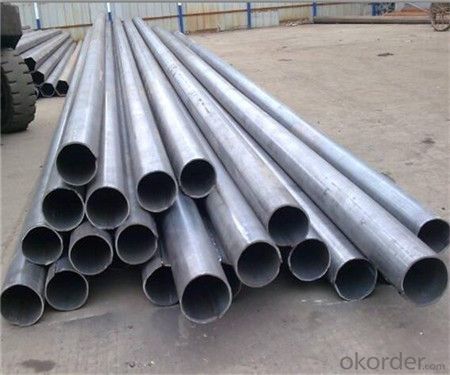
2、API 5L Line Pipe Specification:
Standard | GB, DIN, ASTM ASTM A106-2006, ASTM A53-2007 |
Grade | 10#-45#, 16Mn 10#, 20#, 45#, 16Mn |
Thickness | 8 - 33 mm |
Section Shape | Round |
Outer Diameter | 133 - 219 mm |
Place of Origin | Shandong, China (Mainland) |
Secondary Or Not | Non-secondary |
Application | Hydraulic Pipe |
Technique | Cold Drawn |
Certification | API |
Surface Treatment | factory state or painted black |
Special Pipe | API Pipe |
Alloy Or Not | Non-alloy |
Length | 5-12M |
Outer Diameter | 21.3-610mm |
Grade | 20#, 45#, Q345, API J55, API K55, API L80, API N80, API P110, A53B |
Standard | ASME, ASTM |
1) Material:20#(ASTM A 106/A53 GRB.API5LGRB,GB),45#,16Mn,10#.
2) Specification range:OD:21.3-610mm,WT:6-70mm,length:6-12m or according to the requirement of clients.
3) Excutive standards:GB,ASME API5L.ASTM A 106/A53,Despite of the above standards,we can also supply seamless steel pipe with standard of DIN,JIS,and so on,and also develop new products according to the requirements of our clients!
4) Surface:black lacquered,varnish coating or galvanized.
5) Ends:Beveled or square cut,plastic capped,painted.
6) Packing:bundles wrapped with strong steel strip,seaworthy packing.
3、Main Features of API 5L Line Pipe:
• High manufacturing accuracy
• High strength
• Small inertia resistance
• Strong heat dissipation ability
• Good visual effect
• Reasonable price
4、Packaging & Delivery
Packaging Details: | seaworthy package,bundles wrapped with strong steel strip |
Delivery Detail: | 15-30days after received 30%TT |
5、FAQ of API 5L Line Pipe:
①How is the quality of your products?
Our products are manufactured strictly according to national and internaional standard, and we take a test
on every pipe before delivered out. If you want see our quality certifications and all kinds of testing report, please just ask us for it.
Guaranteed: If products’ quality don’t accord to discription as we give or the promise before you place order, we promise 100% refund.
②How about price?
Yes, we are factory and be able to give you lowest price below market one, and we have a policy that “ for saving time and absolutely honest business attitude, we quote as lowest as possible for any customer, and discount can be given according to quantity”,if you like bargain and factory price is not low enough as you think, just don’t waste your time.Please trust the quotation we would give you, it is professional one.
③Why should you chose us?
Chose happens because of quality, then price, We can give you both.Additionally, we can also offer professional products inquiry, products knowledge train(for agents), smooth goods delivery, exellent customer solution proposals.Our service formula: good quality+good price+good service=customer’s trust
SGS test is available, customer inspection before shipping is welcome, third party inspection is no problem.
- Q: Can steel pipes be used for underground irrigation systems?
- Certainly, underground irrigation systems can indeed utilize steel pipes. Steel pipes have gained popularity for irrigation systems owing to their exceptional durability, strength, and corrosion resistance. They have the capability to endure the immense pressure and stress associated with being buried underground, thus ensuring longevity without the need for frequent maintenance or replacement. Moreover, the smooth interior surface of steel pipes enables efficient water flow and minimizes the risk of clogging. Additionally, steel pipes are readily available in a variety of sizes and can be easily customized to meet specific requirements of irrigation systems. However, it is crucial to ensure that the steel pipes employed for underground irrigation systems are adequately coated or treated to prevent corrosion and extend their lifespan.
- Q: What is the process of spiral steel tube production?
- 1. open panel inspection: after the steel plate is opened, the product line is entered, and the ultrasonic examination of the whole plate is carried out first.2., flat milling: through the anvil machine to make the original coiled steel flat, and then through the milling machine on the edge of the steel plate two sides milling, so as to achieve the required plate width, plate edge parallelism and groove shape.
- Q: What is the minimum temperature that steel pipes can handle?
- The minimum temperature at which steel pipes can withstand depends on the particular grade and composition of the steel. In general, steel pipes can endure extremely low temperatures without encountering significant issues. In fact, numerous steel varieties are specifically engineered to endure freezing temperatures, making them suitable for a range of uses in industries like oil and gas, construction, and cryogenics. However, it is crucial to acknowledge that steel may become more brittle at exceedingly low temperatures, which can impact its mechanical properties. Therefore, it is vital to meticulously choose the appropriate steel grade and consider any specific requirements or limitations for the desired application when determining the minimum temperature that steel pipes can handle.
- Q: What is the tensile strength of steel pipes?
- The grade and type of steel used can cause variation in the tensile strength of steel pipes. However, steel pipes generally possess a high tensile strength. Carbon steel pipes typically have a tensile strength range from 370 to 700 MPa, while alloy steel pipes can have a tensile strength range from 770 to 1200 MPa. These impressive tensile strengths enable steel pipes to withstand substantial pressure and stress, making them suitable for diverse applications in industries like construction, oil and gas, and automotive. It is important to recognize that factors like the manufacturing process, heat treatment, and the presence of defects or imperfections can also impact the tensile strength of steel pipes. Hence, it is recommended to consult the manufacturer's specifications or industry standards to determine the precise tensile strength of a specific steel pipe.
- Q: How do you determine the maximum allowable stress for steel pipes?
- To determine the maximum allowable stress for steel pipes, several factors need to be considered. These factors include the type of steel, the pipe's dimensions, and the operating conditions under which the pipe will be used. Firstly, the type of steel plays a crucial role in determining the maximum allowable stress. Different grades of steel have varying mechanical properties, including yield strength, tensile strength, and elongation. These properties define the material's ability to withstand stress before deformation or failure. Therefore, understanding the specific grade of steel used in the pipes is vital in determining the maximum allowable stress. Secondly, the dimensions of the pipe are essential. The outer diameter, wall thickness, and length all influence the pipe's strength and ability to handle stress. By calculating the cross-sectional area and moment of inertia, engineers can determine the pipe's resistance to bending and axial stresses. These calculations, along with the material properties, help establish the maximum allowable stress. Lastly, the operating conditions under which the pipe will be subjected to are critical. Factors such as temperature, pressure, and the presence of corrosive substances can significantly impact a steel pipe's maximum allowable stress. Elevated temperatures can affect the steel's mechanical properties, while high pressures can induce additional stress. The presence of corrosive substances can lead to material degradation and decrease the pipe's strength. Considering these operational factors is crucial in determining the maximum allowable stress. To sum up, determining the maximum allowable stress for steel pipes involves considering the specific grade of steel, the pipe's dimensions, and the operating conditions. By analyzing these factors, engineers can ensure that the steel pipe is designed and used within its safe stress limits.
- Q: What is the purpose of steel pipes?
- The purpose of steel pipes is to efficiently transport fluids, gases, and solids from one location to another, providing a durable and reliable means of conveying materials in various industries such as construction, oil and gas, plumbing, and infrastructure.
- Q: Can steel pipes be used for aboveground applications?
- Steel pipes have the capability to be utilized in aboveground applications. Their strength, durability, and resistance to corrosion are well-known attributes, making them suitable for a variety of aboveground uses. Industries such as construction, oil and gas, water transportation, and infrastructure development often rely on steel pipes. Aboveground applications for steel pipes include structural supports, handrails, fencing, scaffolding, outdoor pipelines, and various other outdoor structures. Furthermore, steel pipes can undergo coating or painting processes to provide additional protection against weather conditions and enhance their aesthetic appearance. All in all, steel pipes offer versatility for aboveground applications due to their dependable nature and long-lasting performance.
- Q: Are steel pipes suitable for use in pharmaceutical industries?
- Yes, steel pipes are suitable for use in pharmaceutical industries. Steel pipes are known for their durability, strength, and resistance to corrosion, making them ideal for transporting various pharmaceutical materials and fluids safely and hygienically. Additionally, steel pipes can withstand high pressure and temperature conditions, ensuring the integrity and efficiency of pharmaceutical manufacturing processes.
- Q: What is the role of steel pipes in the renewable energy sector?
- The transportation and distribution of various energy sources in the renewable energy sector heavily rely on steel pipes. An important application of steel pipes is seen in the construction of pipelines for transporting natural gas, which is increasingly being used as a cleaner alternative to traditional fossil fuels. Due to its strength, durability, and resistance to corrosion, steel is commonly chosen for these pipelines, ensuring the secure and efficient delivery of natural gas to power plants and other energy consumers. Furthermore, steel pipes are utilized in the installation of geothermal energy systems. Geothermal energy utilizes the heat from the earth's core to generate electricity or provide heating and cooling. Steel pipes are employed to create geothermal wells, allowing the extraction of hot water or steam from underground reservoirs. These pipes must withstand high temperatures and pressures, making steel an ideal material for this purpose. Additionally, hydraulic systems for hydroelectric power plants heavily rely on steel pipes. These power plants generate electricity using the force of flowing water, and steel pipes are used to convey water from the reservoir to the turbines. The durability and reliability of steel ensure the efficient transmission of water, enabling hydroelectric power plants to produce clean and renewable energy. In the construction of solar power plants, steel pipes also play a crucial role. Solar thermal systems concentrate sunlight to generate heat, which is then transferred to a fluid to produce steam and drive turbines. Steel pipes are essential for circulating and transferring this fluid, ensuring the effective operation of the solar power plant. In conclusion, steel pipes are indispensable in the renewable energy sector due to their strength, durability, and resistance to corrosion. They facilitate the transportation of natural gas, the extraction of geothermal energy, the transmission of water in hydroelectric power plants, and the circulation of fluids in solar power plants. By enabling the efficient distribution of various energy sources, steel pipes significantly contribute to the growth and sustainability of the renewable energy sector.
- Q: How are steel pipes protected against external moisture?
- Steel pipes are protected against external moisture through a variety of methods. One common method is the application of a protective coating or paint on the surface of the pipes. This coating acts as a barrier, preventing moisture from coming into direct contact with the steel. The coating can be made of different materials, such as epoxy, polyethylene, or zinc, depending on the specific requirements and environment. Another method of protection is through the use of corrosion inhibitors. These inhibitors are added to the internal or external surfaces of the pipes, forming a protective layer that prevents moisture from causing corrosion. Corrosion inhibitors can be in the form of chemicals, such as rust converters or rust preventatives, which react with the steel to form a protective barrier. Additionally, steel pipes can be protected against external moisture through cathodic protection. This technique involves the use of sacrificial anodes or impressed current to create an electric current that protects the steel. Sacrificial anodes, typically made of zinc, aluminum, or magnesium, are attached to the steel pipes and corrode over time instead of the steel, thus preventing moisture-induced corrosion. Furthermore, proper insulation and waterproofing measures are crucial in protecting steel pipes from external moisture. Insulation materials, such as foam or tape, are applied to the pipes to provide an additional layer of protection and prevent moisture infiltration. Waterproofing measures, such as the use of sealants or membranes, can also be implemented to ensure that no moisture seeps into the pipes. Regular maintenance, including inspections and repairs, is essential to ensure the continued protection of steel pipes against external moisture. By promptly addressing any areas of damage or corrosion, the integrity of the protective measures can be maintained, prolonging the lifespan of the steel pipes and preventing costly repairs or replacements in the future.
Send your message to us
Seamless Steel Pipe High Quality with API 5L
- Loading Port:
- Tianjin
- Payment Terms:
- TT OR LC
- Min Order Qty:
- 25 m.t.
- Supply Capability:
- 20000 m.t./month
OKorder Service Pledge
OKorder Financial Service
Similar products
Hot products
Hot Searches
Related keywords
